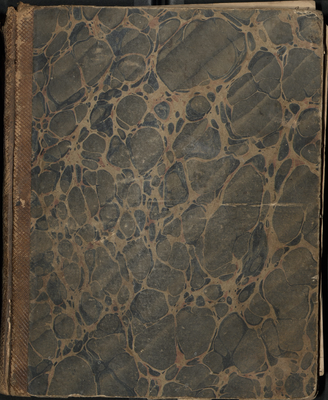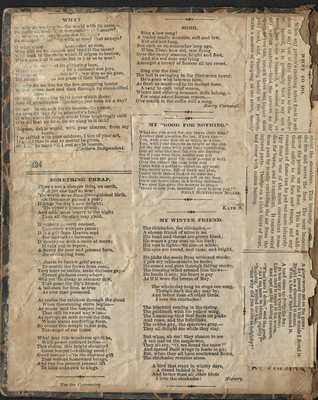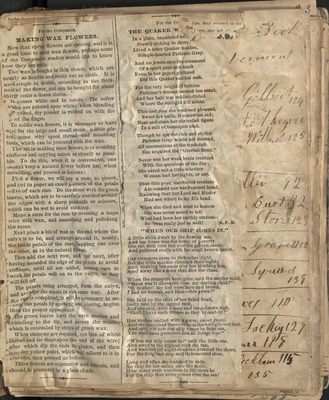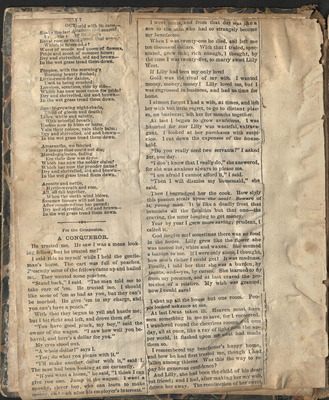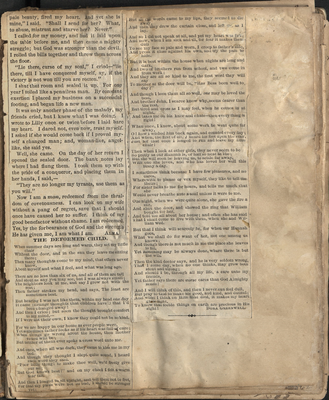Pages
ksul-uasc-mscc208_001
This page is blank
ksul-uasc-mscc208_002
WHY? O! why do we love it- the world with its cares,- Its paths all beset with temptations and snares? O! why do we love it-its few little joys So strangely mixed up with so much that annoys? O why, since so much has cheated us sore, Why still do we cherish and trust it the more? Why bask in the smile which it deigns to bestow, When sure that it smiles but to lure us to woe? O! why do we covet its glittering toys, Which cannot (missing) for a moment our joys, Which soon will erode and grow dim as we gaze, Till ashes above tell the place of their blaze? O! why do we live for the few struggling beams Which come now and then through its cloud-rifted (Missing)eams? O! why do we cling to its loves which decay, And its meaningless friendships just born for a day? O! why do we seek for its honors--its power, So soon do they fly in adversity's hour? O! why since its rough winds blow blightingly chill O're all that we love, do we cling to it still? Begone, fickle world, with yourcharms, from my heart, I'm chilled with your coldness, I tire of your art, If aught that is real to mortal be given, O! Let it be mine till I rest me in heaven. Northern Independent. 134
SOMETHING CHEAP. There's not a cheaper thing on earth, Nor yet one half so dear; 'Tis worth more than distinguished birth, Or thousands gained a year; It lends the day a new delight; 'Tis virtue's firmest shield; And adds more beauty to the night Than all the stars may yield. It maketh poverty content, To sorrow whispers peace; It is a gift from Heaven sent For mortals to increase; It meets you with a smile at morn; It lulls you to repose; A flower for peer and peasant born, An everlasting rose. A charm to banish grief away, To snatch the frown from care ; Turn tears to smiles, make dullness gaySpread gladness everywhere; And yet 'tis cheap as summer dew, That gems the lily's breast; A talisman for love, as true As ever man possessed. As smiles the rainbow through the cloud When threatening storm beginsAs music 'mid the tempest loud, That still its sweet way winsAs springs an arch across the tide, Where waves conflicting foam, So comes this seraph to our side, This angel of our home. What may this wondrous spirit be, With power unheard beforeThis charm, this bright divinity? Good temper!-nothing more! Good temper!- tis the choicest gift That woman homeward brings, And can the poorest peasant lift To bliss unknown to kings. ------------------- For the Companion
SONG Sing a low song! A tender cradle measure, soft and low Not sad nor long, But such as we remember long ago, When Time, now old, was flying Over the sunny seasons, bright and fleet, And the red rose was lying Amongst a crowd of flowers all too sweet. Sing o'er the bier! The bell is swinging in the time-worn tower; He's gone who late was here, As fresh as manhood in its lustiest hour. A song to each brief season, Winter and shining summer, doth belong, -- For some sweet human reason,-- O'er cradle or the coffin still a song. Barry Cornwall
MY "GOOD FOR NOTHING." What are you good for, my brave little man? Answer that question for me, if you canYou, with your fingers as white as a nun, You, with your ringlets as bright as the sun. All the day long with your busy contriving, Into all mischief and fun you are driving; See if your wise little noddle can tell What you are good for- now ponder it well. Over the carpet the dear little feet Came with the patter to climb on my seat; Two merry eyes, full of frolic and glee, Under the lashes looked up unto me; Two little hands pressing soft on my face, Drew me down close in a loving embrace; Two rosy lips gave the answer so true"Good to love you, mamma! good to love you!" Emily Huntington Miller _---- Kate S. -------- MY WINTER FRIEND. The chickadee, the chickadee,- A chosen friend of mine is he. His head and throat are glossy black; He wears a gray coat on his back; His vest is light- 'tis almost white; His eyes are round, and clear, and bright.
He picks the seeds from withered weeds; Upon my table- crumbs he feeds; He comes and goes through falling snows; The freezing wind around him blowsHe heeds it not; his heart is gay As if it were the breeze of May.
The whole day long he sings one song, Though dark the sky may be; And better than all other birds I love the chickadee!
The bluebird coming in the spring, The goldfinch with his yellow wing, The humming-bird that feeds on pinks And roses, and the bobolinks, The robins gay, the sparrows gray,- They all delight me while they stay.
But when, ah me! they chance to see A red leaf on the maple-tree, They all cry, "O, we dread the snow!" And spread their wings in haste to go; But, when they all have southward flown, The chickadee remains alone.
A bird that stays in wintry days, A friend indeed is he; And better than all other birds I love the chickadee! ----------------------Nursery.
WHAT TO DO. When any person's clothing takes fire it is seldom of any use to give directions to the sufferer. Indeed, it is generally best to say not a word, but seize a blanket, a woolen cloak, or any woolen material- hold the corners as far apart as you can, stretch them out higher than your head, and, running boldly to the person, make a motion of clasping in the arms, mostly about the shoulders. This instantly smothers the fire and saves the face. The next instant throw the person on the floor. This is an additional safety to the face and breast, and any remnant of flame can be put out more leisurely. Dry flour is one of the most convenient remedies for burns, and is excellent. It causes relief from pain by totally excluding the air from the injured parts. Dredge on a thick layer of flour, and cover with cotton batting. -------------------- A glow-worm sat on the grass; As I passed through the woods I found it. Bright as a diamond it shone, With a halo of light around it.
A toad came up from the fen; It was ugly in every feature; Like a thief it crept to the worm, And spat on the shining creature.
"What have I done," said the grub. "As I sat here in silence nightly?" "Nothing," replied the toad, "But why did you shine so brightly?" ------------
ksul-uasc-mscc208_003
For the Companion MAKING WAX FLOWERS.
Now that spring flowers are opening, and it is a good time to make wax flowers, perhaps some of the Companion readers would like to know how they are made. The wax bought innthin sheets, which are nearly as flexable and easily cut as cloth. It is used single or double, according to the thickness of the flower, and can be bought for about 30 cents a dozen sheets. It comes white and in colors. The softer shades are painted upon white; when blending is required, dry powder is rubbed on with the tip of the finger. To make wax flowers, it is necessary to have wire for the large and small stems, a little gluten, some wiry spool thread- and moulding tools, which can be procured withnthe wax. The art in making these flowers, is in avoiding stiffness and copying nature as closely as possible. To do this, when it is convenient, one should keep a nayural flower before her, when moulding, and proceed as follows: Pick a flower, we will say a rose, to pieces, and cut it in paper an exact pattern of the petals --five of each size. Do the same with the geeen leaves, which are to be carefully notched around the edges with a sharp penknife or sissors, which can be wet to avoid sticking. Make a stem for the rose by covering a large wire with wax, and smoothing and polishing the same. Next place a bit of wax on the end where the calyx is to be, and arrange around it, neatly, the inside petals of the rose, lapping one over the other, as in the natural flower. Then add the next row, and the next, after having moulded the edge of the petals to avoid stiffness, until all are added, taking care to work the petals well on to the calyx, or they will fall off. The petals being arranged, form the calyx, and arrange the sepals in the same way. After the rest is completed, it will be necessary to arrange the petals by opening and closing, to give them the proprr appearance. The green leaves have the wire smaller and extending to the tip, across the middle, which is concealed by strips of green wax. When stamens are required, cut bits of white thread and tie them upon the end of the wire; after which dip the ends in gluten, and then into dry yellow paint, which will adhere to it in globules, then proceed as before. These flowers are expensive and delicate, and should be protected by a glass shade. -----------------For the Companion THE QUAKER WIFE In a plain, unpainted cottage, Slowly sinking to decay, Lived a sober Quaker maiden, Simple-hearted Patience Gray. And no jewels save the ornament Of spirit pure and meek Even in her gayest girlhood Did this Quaker Maiden seek. For the very height of fashion Patience's dresses seemed too scant, And her hair was reddish-tinted Where the sunlight fell aslant. Thee and thou she rendered pleasant Sweet her smile, if somewhat sad; Neat and clean her shrivelled figure In a suit of homespun clad. Though to ape the rich and stylish Patience Gray would not decend, All unconscious at the wash-tub She acquired the "Grecian Bend." Never was her weak brain troubled With the questions of the day; She cared not a tittle whether Woman had her rights or nay. Thus this poor, unlettered creature Ate content her hard-earned bread, Knowing that her Lord and Master Had not where to lay His head. When she died and went to heaven She was never asked to tell What had been her earthly stationSo 'twas really just as well! M.P.R.
"WHEN OUR SHIP COMES IN." A little child dwelt by the sea, And her home was the home of poverty. She ran with bare feet o're the golden sands, And gathered shells with her small brown hands. Gay strangers came in rich robes dight, But the little maiden shunned their sight; And shaking her curls o're her blushing face, Sped away like a fawn that flies the chase. When strangers were gone, said the mother mild, "What was it dismayed thee, my darling child?" "O, mother! my feet were bare and brown, I had no bonnet, and then- this gown!" She held up the skirt of her faded frock, Sadly rent by the jagged rock, And she said, with a deep and long drawn sigh, "Shall I have such dresses as they by-and-by?" Her mother smiled with a grave, sweet grace, And she smoothed the curls from the half-grieved face, And sad, "When our ship comes in from the sea, You shall have garments and all things free." "When our ship comes in!" said the little one, And away to the highest rock she ran, And watched till night-shadows dimmed the shore, For the freighted ship and its treasured store. Long and often she watched in vain. No ship for her sailed over the main. How many such watchers in life there be For the ship that never comes over the sea!
-_---------------------------
ksul-uasc-mscc208_004
OCTOBER Shake the last dust from the (missing) Royal rose or this (missing) Which is fairer now? Worst of weeds and queen of flowers, Pride and mock of summer hours; Dry shrivelled, old and brownIn the wet grass tread them down.
Poppies, with the morning's Burning beauty flushed; Little-cared-for daisies, Used to being crushed; Loveless, scentless, side by sideWhich now most cause for pride? Dry and shrivelled, old and brownIn the wet grass tread them down.
Rankly-growing night-shade; Child of gloom and death; Lillies, white and saintly, With celestial breath; Useless now to bless or harm, Vain their poison, vain their balm; Dry and shrivelled, old and brownIn the wet grass tread them down.
Amaranths, we fancied Flowers that could not die; Morning-glories, fading Ere their dew was dryWhich has now the nobler claim? Which has now the prouder name? Dry and shivelled, old and brownIn the wet grass tread them down.
Aconite and nettle, Myrtle-wreath and rose, All, all fall together, When the north wind blows. Summer honors will not last After summer-time has passed; Dry and shrivelled, old and brownIn the wet grass tread them down. -----------------------
For the Companion.
A CONQUEROR. He trusted me. He saw I was a mean looking fellow, but he trusted me!" I said this to myself while I held the gentleman's horse. The cart was full of peaches. Presently some of the fellows came up and hailed me. They wanted some peaches. "Stand back," I said. "The man told me to take care of 'em. He trusted me. I should like some of 'em as bad as you, but they can't be touched. He give 'em in my charge, and you can't have a peach." With that they begun to yell and hustle me; but I hit right and left, and drove them off. "You have good pluck, my boy," said the owner of the wagon. " I saw how well you behaved, and here's a dollar for you." My eyes stood out. "A whole dollar!" says I. "Yes; do what you please with it." "I'll make another dollar with it," said I. The man had been looking at me earnestly. "If you want a home," he said, " I think I can give you one. Jump in the wagon. I want a spunky, clever boy, who can learn to make money, and look after his employer's interests." I went home, and from that day was like a son to the man who had so strangely become my benefactor. When I was twenty-one he died, and left me ten thousand dollars. With that I traded, speculated, geew rich; rich enough, I thought, by the time I was twenty-five, to marry sweet Lilly West. If Lilly had been my only love! Gold was the rival of my wife. I wanted money, momey, money! Lilly loved me, but I was engrossed in business, and had no time for home. I almost forgot I had a wife, at times, and left her with but little regret, to go distant places, on business; left her for months together. At last I began to grow avaricious. I was haunted for fear Lilly was wasteful, extravagant. I looked at her purchases with suspicion. I cut down the expenses of the household. "Do you really need two servants?" I asked her, one day. "I don't know that I really do," she answered, for she was anxious always to please me. " I am afraid I cannot afford it," I said. "Then I will dismiss my housemaid," she said. Then I begrudged her the cook. How slyly this passion steals upon the doul! Beware of it, young man. It is like a deadly frost that benumbs all the faculties but that one- the craving, the utter longing to get money. Year by year I grew more saving; prudent, I called it. God forgive me! sometimes there was no food in the house. Lilly grew like the flower she was named for, white and waxen. She seemed a burden to me. If I were only alone, I thought, how much richer I could get! It was madness. Finally, I told her that she was a burden, by taunts, and-yes, by curses. She learned to fly from my presence, and at last craved the protection of a relative. My wish was granted; now I could save! I shut up all the house but one room. People looked askance at me. At last I was taken ill. Heaven must have seen something in me to save, for I recovered. I wandered round the cheerless rooms, and one day, all at once, like a ray of light from the upper world, it flashed upon me what had made them so. I remembered my benefactor's happy home, and how he had first trusted me, though I had fallen amoung thieves. Was this the way to re-pay his generous confidence? And Lilly, she had been the child of his dearest friend; and I had, after making her my wife, driven her away. The recollection of her sweet
ksul-uasc-mscc208_005
pale beauty, fired my heart. And yet she is mine," I said. "Shall I send for her? What, to abuse, mistrust and starve her? Never."
I called for my money, and had it laid upon the table before me, and then came a mighty struggle; but God was stronger than the devil. I rolled the bills together and threw them across the floor.
"Lie there, curse of my soul," I cried - "lie there, till I have conquered myself, ay, if the victoroy is not won till you are rotten."
I shut that room and scaled it up. For one year I toiled like a penniless man. By constant exertion I place my business on a successful footing, and began life a new man.
It was only another phase of the malady, my friends cried, but I knew what I was doing. I wrote to Lilly once or twice before I laid bare my heart. I dared not, even now, trust myself. I asked if she would come back if I proved myself a changed man; and, woman-like, angellike, she said yes.
Well, she came. On the day of her return I opened the sealed door. The bank notes lay where I had flung them. I took them up with the pride of a conqueror, and placing them in her hands, I said,-
"They are no longer my tyrants, use them as you will"
Now I am a man, redeemed from the thraldom of covetousness. I can look on my wife without a pang of regret, save that I should once have caused her to suffer. I think of my good benefactor without shame. I am redeemed. Yes, by the forbearance of God and the strength He has given me, I am what Iam. ALMA.
THE DEFORMED CHILD.
When summer days are long and warm, they set my little chair
Without the door, and in the sun they leave me sitting there;
Then many thoughts come to my mind, that others never know,
About myself and what I feel, and what was long ago.
There are no less than six of us, and all of them are tall And stout as any you may see, but I was always small; The neighbors look at me, and say I grow not with the rest;
The father strokes my head, and says, The least are sometimes best.
But hearing I was not like them, within my head one day it came (strange thought that children have!) that I'd been changed away!
And then I cried; but soon the thought brought comfor to my mind,-
If I were not their own, I know they could not be so kind.
For we are happy in our home as ever people were, Yet sometimes rather looks as if his heart was full of care; When things go wrong about the house, then mother vexed will be;
But neither of them ever spoke a cross word unto me.
And once, when all was dark, they came to kiss me in my bed.
And though they thought I slept quite sound, I heard each word they said.
"Poor little thing! to make thee well, we'd freely give our all;
But God knows best!" and on my cheek I felt a warm tear fall.
And then I longed to sit upright, and tell them not to fret, For that my pains were not so bad, I should be stronger yet;
But as the words came to my lips, hey seemed to die away,
And then they drew the curtain close, and left me as I lay.
And so I did not speak at all, and yet my heart was full; And now, when I am sick and ill, for fear it makes them dull
To see my face so pale worn, I creep to father's side, And press it close against his own, and try the pain to hide.
But it is best within the house when nights are long and dark,
And two of brothers run from school, and two come in from work;
And they are all so kind to me, the first word they will say
To mother at the door will be, "Has Bess been well to day?"
And though I love them all so well, one may be loved the best,
And brother John, I scarce know why, seems dearer than the rest.
But tired and cross as I may feel, when he comes in at night,
And take me on his knee and chats - then ever thing is right!
When once, I know, about some work he went quite far away,
O ! how I wished him back again, and counted every day; And when, the first of all, I heard his foot upon the stair, Just for that once I longed to run and leave my little chair!
Then when I look at other girls, they never seem to be So pretty as our Hannah is, or half so neat as she; But she will soon be leaving us, to settle far away, With one she loves, and who has loved her well this many a day.
I [sometlmes] think because I have few pleasures, and no cares,
Wherewith to please or vex myself, they like to tell me theirs;
For sister talks to me for hours, and tells me much that she
Would never breather unto a soul unless it were to me.
One night, when we were quite alone, she gave the fire a stir,
And shut the door, and showed the ring that William bought for her,
And told me all about her house; and often she has said That I shall come to live with them, when she and William wed.
But that I think will scarcely be, for when our Hannah goes,
What we shall do for want of her, not one among us knows;
And though there is not much in me the place she leaves to fill,
Yet something may be always done, where there is but the will.
Then the kind doctor says, and he is very seldom wrong, That I some day, when no one thinks, may grow both stout and strong;
And should I be, through all my life, a care unto my friends,
Yet father says there are worse cares than God Almight sends!
And I will think of this, and then I never can feel dull, But pray to God to make me good, and kind, and dutiful; And when I think on Him that died, it makes my heart grow light,
To know that feeble things on earth are precious in His sight! DORA GREENWELL. ***************************************************
